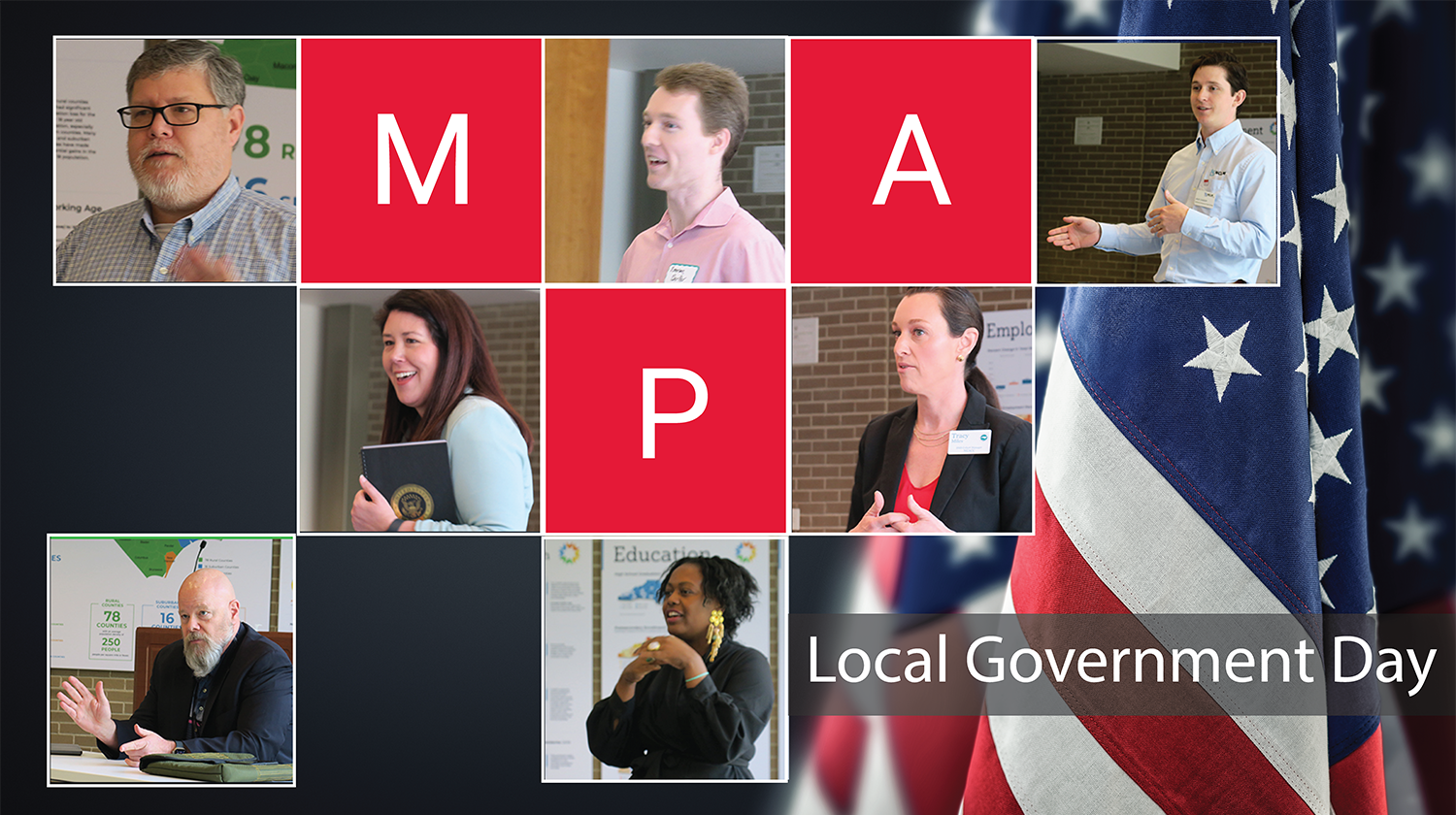MPA Students Take Part in Local Government Day
NC State's MPA Alumni serving in local government share wisdom, advice

On Friday, March 28, NC State University’s Department of Public Administration held “Local Government Day” at the North Carolina Rural Center in Raleigh. Students in the MPA program learned about local government vocations and asked questions to current leaders as they considered roles that might suit their career aspirations.
MPA director Mandi Stewart and Traci Appling, assistant teaching professor and external relations and internship director at the School of Public and International Affairs hosted the event, which included five NC State MPA Alumni: Bill Holmes, instructor in the MPA program and senior director of communications for the NC Rural Center; Emerson Barker, department business manager of Wake County Environmental Services; Chris Blue, formerly the town manager and chief of police for the Town of Chapel Hill; Jack Cassidy, learning and development program manager for the NC League of Municipalities; Joy Anderson Hicks, director of advocacy and policy at the NC Association of County Commissioners; and Rebekah Shamberger, a housing specialist in Apex. Along with the alumni, Tracy Miles of the NC Association of County Commissioners also addressed the students.
“What do you want to do along your journey?” Emerson Barker asked. “What do you want to see and experience?”
Barker shared stories from the various roles he’d served in local government across the years, as well as in his internships and emphasized that students should not think so much about the title and position of their dream job and then pursue it doggedly, but instead learn to fully engage in exploring each step of their career journey to find their ultimate destination.
“I would have said in the beginning that I wanted to be a city or a county manager,” he explained, “But over time, I learned that county managers have a high-stress job that can be very volatile, and that they are elected to the position, so there’s that additional stress. I realized that a department manager role was a better fit for me.”
Jack Cassidy agreed. He began his career as a journalist but found a career in local government a better fit for him.
“You can pivot and find other opportunities in local government that might work better for you than you thought,” he said.
Cassidy said working for the NC League of Municipalities used both his journalistic and MPA skills and provided challenges and interests in his daily job without undue stress.
“It’s not a competitive, cut-throat environment,” he explained. “We are all working together, trying to do something better for our towns. Government can be very boring on paper – bills are hard to parse and are full of legalese – but on the other hand, it’s not boring at all, because you’re a part of huge initiatives that can bring real benefits to the community.”
NC Rural Center Representative Bill Holmes explained that working for rural areas of government had different parameters of service than most local government efforts.
“We worry about getting Google Fiber, but the rural areas are upset about only having broadband,” he explained. “We complain about bad health care, but they complain about having no medical facilities.”
He noted that many of the rural areas would greatly welcome the expertise and contributions of the MPA students, and that they would find themselves in positions of strong influence in these areas that don’t have as many resources.
Joy Anderson Hicks talked about the benefits she found in serving as a nonpartisan person in government. Hicks enjoyed working in agribusiness and learned over time there was a lot of give and take in government affairs to serve the agriculture community.
She told the students the important thing in career development was to understand their individual talents and interests and use that as their primary career guide.
“Get your foot in the door, network, and follow your passion,” she said. “Look for that pathway to express your passion.”
Tracy Miles, also of the NCACC, agreed.
“Lots of us didn’t know what we wanted to do when we started out,” she said. “I had a set of values and beliefs and those turned into career opportunities. I had a strong need to be part of my community. North Carolina is a big ‘small state’, so you can find your way through relationship building.”
Chris Blue was a reluctant recipient of his career. He became the town manager for Chapel Hill after the former one retired and members of the town council approached him to accept the job.
He recommended a leadership book to the group about mutual learning and noted that being a good leader required authenticity and the willingness to discuss the undiscussable.
“If you want to be a good leader,” he said, “you have to show up to the gas pump sometimes. Make sure you share with all of your staff the same information you share at executive meetings and explain your reasoning and intent. If the upper or mid-level managers don’t show up for a day – it isn’t as noticeable – but if your front-line people don’t show up, it has a huge impact – so it’s important that they are kept in the loop.”
Rebekah Schamberge ended the day by talking about how she enjoyed the person-centered work of local government.
“If you are mission-driven, choose to work for the local government,” she said. “It’s about everything that affects you in your daily life and you are able to work more directly with your public constituency and have an impact on their daily lives. “
She wanted to expand her influence with public housing after working for the city of Raleigh in community development, so she now works with Apex in its affordable housing efforts.
“It’s a massive issue in the nation as well as in the counties,” she said. “There’s a lot of interdisciplinary work when it comes to community development – for community initiatives in general. You have to continuously evolve as a public servant – you are beholden to your community to do so.”
Local Government Day is one of several extra-curricular activities scheduled during the academic year that enable MPA Students to network and strengthen their career opportunities.
“The insights of our alumni are valuable complements to the instruction our students receive in the classroom,” said MPA director Stewart. “We’re grateful for how alumni shared their individual and collective wisdom of how their careers unfolded so that our students may have that vision of what lies ahead in their public service careers.”
- Categories:


